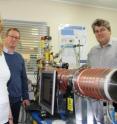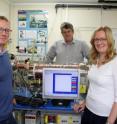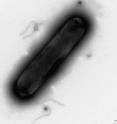Scientists develop 'electronic nose' for rapid detection of C. diff infection
Related images
(click to enlarge)
A fast-sensitive "electronic-nose" for sniffing the highly infectious bacteria C-diff, that causes diarrhea, temperature and stomach cramps, has been developed by a team at the University of Leicester. Using a mass spectrometer, the research team has demonstrated that it is possible to identify the unique 'smell' of C-diff which would lead to rapid diagnosis of the condition.
What is more, the Leicester team say it could be possible to identify different strains of the disease simply from their smell -- a chemical fingerprint -- helping medics to target the particular condition.
The research is published on-line in the journal Metabolomics.
Professor Paul Monks, from the Department of Chemistry, said: "The rapid detection and identification of the bug Clostridium difficile (often known as C-diff) is a primary concern in healthcare facilities. Rapid and accurate diagnoses are important to reduce Clostridum difficile infections, as well as to provide the right treatment to infected patients.
"Delayed treatment and inappropriate antibiotics not only cause high morbidity and mortality, but also add costs to the healthcare system through lost bed days. Different strains of C. difficile can cause different symptoms and may need to be treated differently so a test that could determine not only an infection, but what type of infection could lead to new treatment options."
The new published research from the University of Leicester has shown that is possible to 'sniff' the infection for rapid detection of Clostridium difficile. The team have measured the Volatile Organic Compounds (VOCs) given out by different of strains of Clostridium difficile and have shown that many of them have a unique "smell." In particular, different strains show different chemical fingerprints which are detected by a mass spectrometer.
The work was a collaboration between University chemists who developed the "electronic-nose" for sniffing volatiles and a colleague in microbiology who has a large collection of well characterised strains of Clostridium difficile.
The work suggests that the detection of the chemical fingerprint may allow for a rapid means of identifying C. difficile infection, as well as providing markers for the way the different strains grow.
Professor Monks added: "Our approach may lead to a rapid clinical diagnostic test based on the VOCs released from faecal samples of patients infected with C. difficile. We do not underestimate the challenges in sampling and attributing C. difficile VOCs from fecal samples."
Dr Martha Clokie, from the Department of Microbiology and Immunology, added: "Current tests for C. difficile don't generally give strain information -- this test could allow doctors to see what strain was causing the illness and allow doctors to tailor their treatment."
Professor Andy Ellis, from the Department of Chemistry, said: "This work shows great promise. The different strains of C-diff have significantly different chemical fingerprints and with further research we would hope to be able to develop a reliable and almost instantaneous tool for detecting a specific strain, even if present in very small quantities."
Source: University of Leicester
Other sources
- Sniffing-out smell of disease in feces: 'Electronic nose' for rapid detection of clostridum difficile infectionfrom Science DailyTue, 2 Sep 2014, 5:31:00 UTC
- Scientists develop 'electronic nose' for rapid detection of C. diff infectionfrom PhysorgSun, 31 Aug 2014, 23:00:18 UTC


